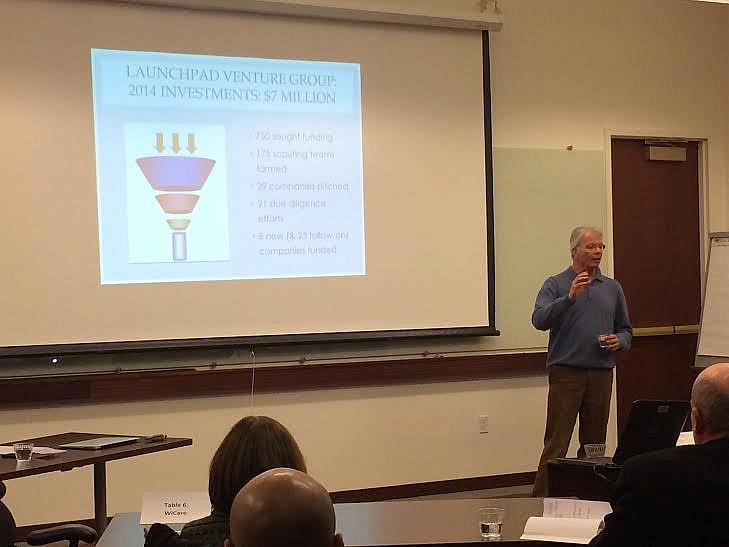
The Social Innovation Forum (SIF) launched its 4th annual Social Business Accelerator on January 19, kicking off 12 intense weeks of programming for the six social impact businesses in the cohort. Curious about what goes on in an accelerator? Interested in learning more about impact investing? We’ve launched this blog series, Insights into Impact Investing, to offer a glimpse inside our Social Business Accelerator and share some of our learnings from our work in the emerging field of impact investing.
On Tuesday, February 9, SIF’s Impact Entrepreneur cohort came together for the fourth session in our 2016 Social Business Accelerator to hear from guest speaker John Conley, an experienced entrepreneur and venture capitalist, about the Angel Investor’s perspective. He drew on his experience as Chief Operating Officer at LaunchPad Venture Group to paint a picture of best practices when pitching to investors. LaunchPad screened 750 companies vying for $7 million worth of investments in 2014, which helped the group finely tune its investment practices model.
John emphasized the importance of clear communication, authenticity to the founders’ story, and actively defining “the very nature by which you and your venture can meet a demand.” Any investment pitch must understand and respond reasonably to the market’s pain points. In the case of impact investors, this means the entrepreneur must explicitly highlight the social impact of the products and services provided.
Any entrepreneur should be capable of talking about their business in a way that harmonizes investors’ mindsets on a case-by-case basis.
John used a metaphor to drive this point home, by comparing three different entrepreneurial ventures based on levels of necessity as seen by the investor: jewelry, aspirin, and oxygen. Jewelry, being beautiful, but on the whole unnecessary, would not get much interest from angel investors and would most likely be denied any investments. Aspirin, while much more practical, is still seen as a bit of a luxury, and can be passed over when reacting to the markets’ pain points. Oxygen, however, is a necessary component and would be an automatic and reasonable product to invest in by angel and impact investors alike. John encouraged the entrepreneurs to frame their pitches as though their products and services were oxygen, by shaping their mindset about their products around the Investors’ points of view. Entrepreneurs, Conley explains, think about the possibilities of their products and innovations rather than the potential practicality of such products in the modern market.
A lively Q&A session followed, where Entrepreneurs and Mentors alike inquired about a variety of investing facets, including specific knowledge of angel investors in the greater Boston area, tips for best closing pitch practices, and estimated company value-adds. In closing, John emphasized that “any Entrepreneur should be capable of talking about their business in a way that harmonizes investors’ mindsets on a case-by-case basis.”
About the Presenter
John Conley is the Chief Operating Officer at Entrepreneurship for All (EforAll), a nonprofit whose programs are designed to encourage entrepreneurship as a means to improve communities by strengthening employment opportunities. Previously John worked in the life sciences industry. He co-founded Gilliam Capital LLC, a life science investment firm, and was a co-founder of the RNA interference company Alnylam Pharmaceuticals where he held the position of Vice President, Strategy and Finance and CFO through to its successful 2004 IPO. He held a variety of positions at Transkaryotic Therapies and Biogen in marketing, business development, sales and finance. He was a Manager at the strategy consulting firm of Bain & Company and has recently been Board Chair of The YMCA of Greater Boston and of The Jericho Road Project. Mr. Conley graduated with a Bachelor’s in Economics from the University of Pennsylvania’s Wharton School and an MBA from the Yale School of Management. He was a 2014 Fellow in the Advanced Leadership Initiative at Harvard University.
About the Author
Jackie Rothmeier was the Social Innovation Forum's Program Co-op from January to June of 2016. In this role, she worked closely with the Manager of Strategic Partnerships and the Senior Manager of Development and Communications to support Social Innovation Forum's programming, communications, and events.
 Social Innovation Forum
Social Innovation Forum